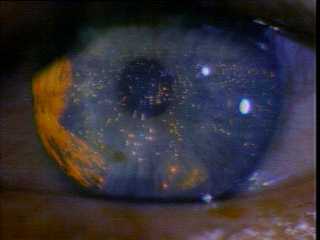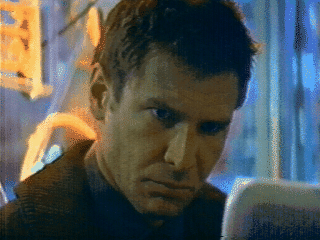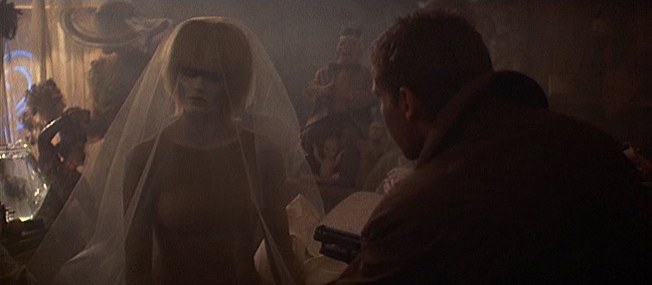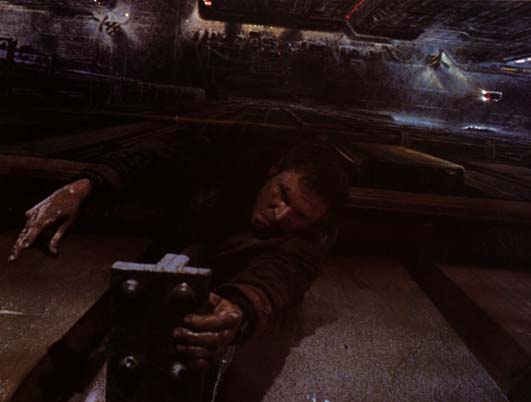

![]() Using
the film Blade Runner for GCSE English.
Using
the film Blade Runner for GCSE English.
Blade Runner
Harrison Ford, Rutger Hauer. Director Ridley Scott.
1982
______________________________________________________________________
 The storyline has
a future Los Angeles (in 2019) in which wealthy people have abandoned the earth
for other worlds leaving only the poor and depressed behind. Androids, called
Replicants were made to perform tasks but became too advanced and were banned
from the earth. Four have escaped and made their way to earth. Harrison Ford
as Deckard is a special policeman called a Blade Runner whose task it is to
terminate the Replicants.
The storyline has
a future Los Angeles (in 2019) in which wealthy people have abandoned the earth
for other worlds leaving only the poor and depressed behind. Androids, called
Replicants were made to perform tasks but became too advanced and were banned
from the earth. Four have escaped and made their way to earth. Harrison Ford
as Deckard is a special policeman called a Blade Runner whose task it is to
terminate the Replicants.
 There is also an oriental atmosphere - reflecting perhaps the director's vision of the future as a western
world over-run by advancing oriental commerce. On the advertising wall the Coke
adverts are followed by geisha girls and Japanese hi-fi companies. There is
no fresh food, only noodles and other oriental fast food. Briefly there is an
alternative Arab style market place too showing that US
culture has been over-run by other influences and cultures.
There is also an oriental atmosphere - reflecting perhaps the director's vision of the future as a western
world over-run by advancing oriental commerce. On the advertising wall the Coke
adverts are followed by geisha girls and Japanese hi-fi companies. There is
no fresh food, only noodles and other oriental fast food. Briefly there is an
alternative Arab style market place too showing that US
culture has been over-run by other influences and cultures.
The Replicants have a fixed four year life span as a fail-safe device. The only way they can be spotted is by a Blade Runner giving them a Voigt-Kompt test which checks their irises to see if they have emotional reflexes. After one of these tests a Blade Runner is killed by the replicant he was testing. After another test an apparently attractive secretary turns out to be a replicant, a special model (Rachel) who has to be tested with many more questions than is usual, because she is so like a real human.
 A reluctant Deckard kills three of the replicants but develops a relationship with Rachel.
A reluctant Deckard kills three of the replicants but develops a relationship with Rachel. ![]()
![]() The designer of the androids - Tyrrell, director of the Tyrrell corporation,
has manufactured her, for his own personal use, to include emotions. "Rachel
is a very special robot." She is upset when Deckard callously tells her
she's just a replicant. She asks: "Deckard, did you ever take that Voigt-Kompt
test yourself?" He does not reply, but his voice-over comments: "Replicants
were not supposed to have feelings - neither should Blade Runners."
The designer of the androids - Tyrrell, director of the Tyrrell corporation,
has manufactured her, for his own personal use, to include emotions. "Rachel
is a very special robot." She is upset when Deckard callously tells her
she's just a replicant. She asks: "Deckard, did you ever take that Voigt-Kompt
test yourself?" He does not reply, but his voice-over comments: "Replicants
were not supposed to have feelings - neither should Blade Runners."
It seems the line dividing replicants and people is so fine as to be invisible. The affection between Deckard and Rachel develops and they clearly have feelings for each other. As Deckard begins to be protective of Rachel she actually saves his life by shooting one of the replicants who is trying to kill him. She is acting as if she were human. In fact the characters of Batty and Rachel have a lot to teach us - and especially the hardened and brutal Deckard - about human behaviour.
We meet Sebastian, a genetic designer who helped design the replicants. Ironically he is suffering from a genetic disease called Methuselah Syndrome which makes him age rapidly. Roy, the leader replicant, comments that they have that in common - "accelerating decrepitude" - a short life span. Even his home, the abandoned but once palatial Bradbury Building is suffering the decay of ageing. Sebastian is surrounded by toy robots, his only companions - obviously different from the humanoid replicants, but another ironic comment. We note also that there are no families in this story, and no friends.
The replicants are on earth, we discover, in order to find out how long they have to live (a four year life span) and whether this can be extended. Like real humans they are concerned about life and death. Roy complains, "We're not computers, we're physical." Tyrrell tells Roy "The light that burns twice as brightly burns for half the time" and points out what a wonderful life he has led. But he must die soon. Roy kisses him then with a contorted face crushes his head, killing the man who "made" him.
We realise that there is very little difference
between man and android. Both man and android
have concerns about life and death, they both seem to show emotion, they both
kill replicants.
Deckard (portrayed as a licensed killer) has little emotion although
he is human (though there is a theory he himself is a replicant);
Rachel seems to have real emotion although she is an android
(she is sensitive, tears trickle down her face when Deckard harshly makes her
face up to being a replicants).
Roy demonstrates superhuman powers when pursuing Deckard but
shows "humanity" when sparing his life at the end.
The "incept date" and the question of longevity affect Rachel as much
as the other replicants, but there is a strong suggestion that Rachel may last
longer because she was made personally for Tyrrell and without an expiry date.
 In a final battle between Deckard and the replicants
Pris disguises herself as a tailor's dummy surrounded by mechanical toys in
Sebastian's apartment and almost throttles Deckard. Here the nearly human replicants
ironically surrounds herself with robotic toys and dummies, echoing the death
of Zhora who was shot amongst shop window dummies. In the middle of a vicious
flick-flack Deckard shoots her and we see her final death throes, grotesquely
vigorous kicking and thrashing until she is shot again in the chest. Deckard
pursues Roy who is more intelligent, stronger and fitter than Deckard, but who
also shows his emotions by tenderly kissing the dead Pris.
In a final battle between Deckard and the replicants
Pris disguises herself as a tailor's dummy surrounded by mechanical toys in
Sebastian's apartment and almost throttles Deckard. Here the nearly human replicants
ironically surrounds herself with robotic toys and dummies, echoing the death
of Zhora who was shot amongst shop window dummies. In the middle of a vicious
flick-flack Deckard shoots her and we see her final death throes, grotesquely
vigorous kicking and thrashing until she is shot again in the chest. Deckard
pursues Roy who is more intelligent, stronger and fitter than Deckard, but who
also shows his emotions by tenderly kissing the dead Pris.
He dislocates Deckard's fingers and with bitter humour and supreme confidence returns his gun to Deckard's twisted hand. Ironically moments later we find Roy forcing his own hand open as a kind of rigor mortis heralds the first signs of his own impending death. He pulls a rivet from a metal girder with his fingers and forces it through the palm of his hand in an attempt to keep himself conscious. Then he rams his head through a wall to see Deckard and prove his superhuman strength. Deckard runs off but cannot hide for long. He re-locates his own twisted fingers thereby showing that he too can endure great pain.
The final battle
scene focuses first on Deckard's twisted fingers hanging
on to the building but about to fall. Roy stands over him: "Quite an experience
to feel fear. That's what it's like to be a slave."
![]() Here, ironically, Roy is giving Deckard the experience of fear. He also shows
here that as an android he knows he is only a slave to the humans who made him
and is destined to die. He is, ironically, mortal.
Here, ironically, Roy is giving Deckard the experience of fear. He also shows
here that as an android he knows he is only a slave to the humans who made him
and is destined to die. He is, ironically, mortal.
 Just as Deckard loses his grip and is about to plunge to his death, Roy flashes out his hand and
pulls him to safety. Roy looks at Deckard.
Just as Deckard loses his grip and is about to plunge to his death, Roy flashes out his hand and
pulls him to safety. Roy looks at Deckard.
![]() "I've seen things you people wouldn't believe. Attack ships
on fire off the shoulder of Orion. I've watched c-beams glitter in the dark
near the Tanhauser Gate. All these moments will be lost in time... like tears
in rain. Time to die." His head slumps and Deckard can only stare, relieved
and astonished, wondering why this android saved his life. A symbolic bird flies
off. Roy sits motionless, pale blue, a lifeless statue to ... ?
"I've seen things you people wouldn't believe. Attack ships
on fire off the shoulder of Orion. I've watched c-beams glitter in the dark
near the Tanhauser Gate. All these moments will be lost in time... like tears
in rain. Time to die." His head slumps and Deckard can only stare, relieved
and astonished, wondering why this android saved his life. A symbolic bird flies
off. Roy sits motionless, pale blue, a lifeless statue to ... ?
The final scene shows Deckard returning to Rachel. They say they love each other and he takes her away from LA. In the commercial verrsion of the film we see our first views of the countryside as the plane flies over the hills and into the sky in a clear break from the bad old world of built up areas and unnatural lighting. Deckard's voice over says "Tyrrell had told me Rachel was special - no termination date. I didn't know how long we had together. Who does?" In the Director's Cut Gaff's echoing voice says much thesame thing.
The final music is from the song "You're just too good to be true..."
We know Roy and Rachel have feelings,
emotions, memories which did not come from simply adding human memories to a
computer chip. It's hard to make the leap from a desktop
computer to an android with emotions. When Deckard dreams of the unicorn
it should be a private dream, yet Gaff, by leaving an origami unicorn on the
landing hints that he knows about the dream. How could this be unless Gaff has
seen the data implanted in Deckard's mind?
What is the difference between androids acting in every way like humans - and
humans themselves?
We are left wondering what makes us human, what are we searching for, what might
we do to this world. Would it make any difference if Deckard was really a replicant
too?
DSG 4.7.00